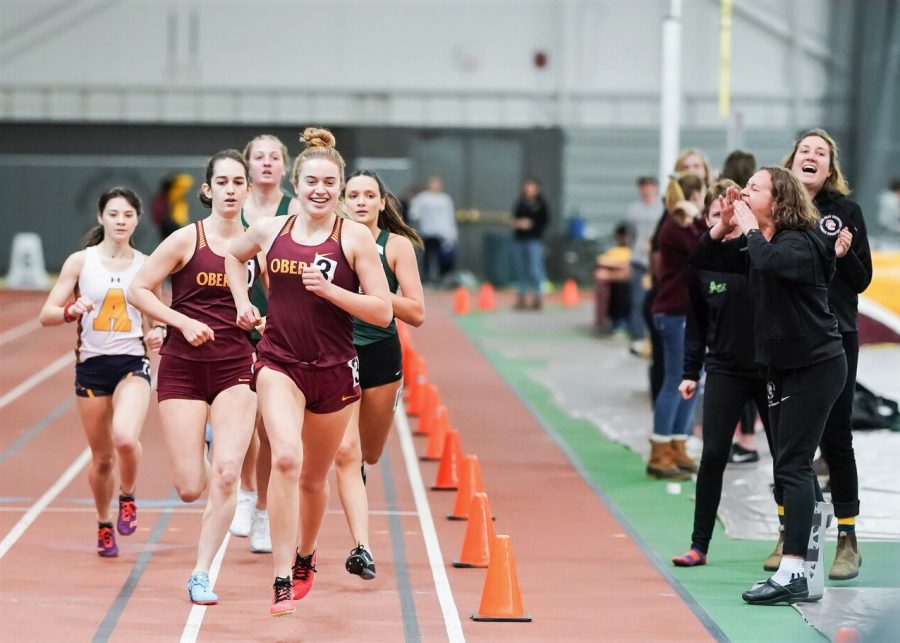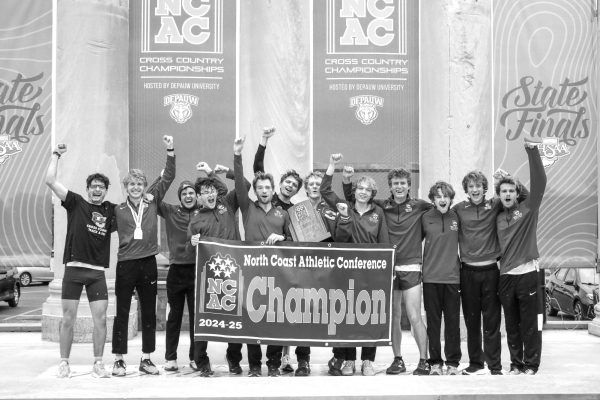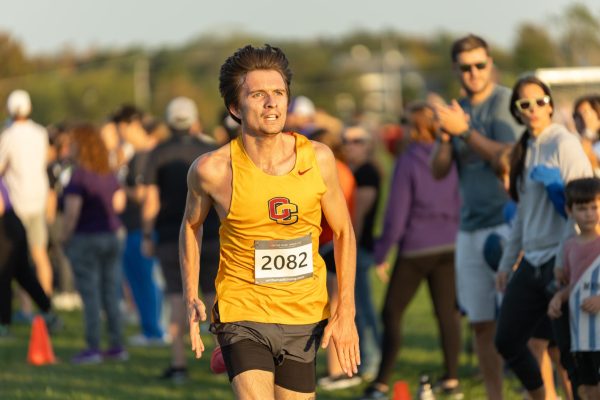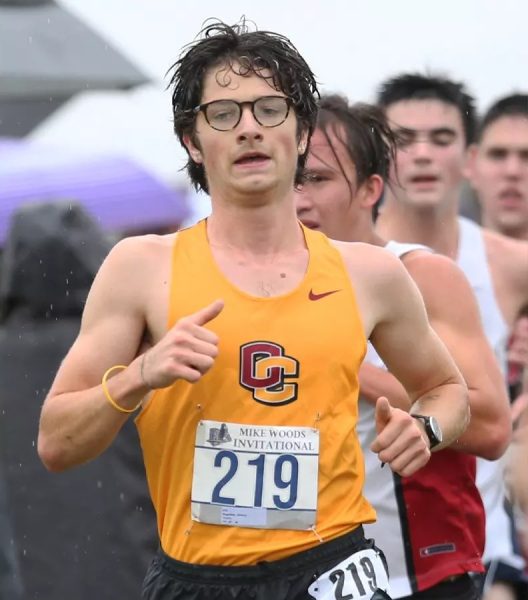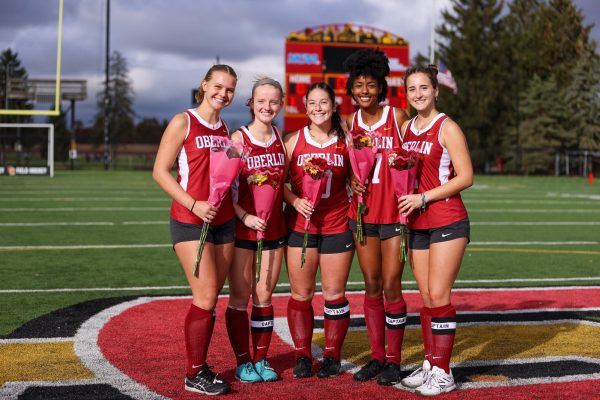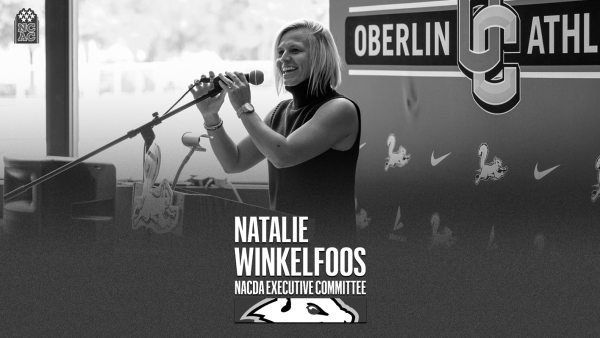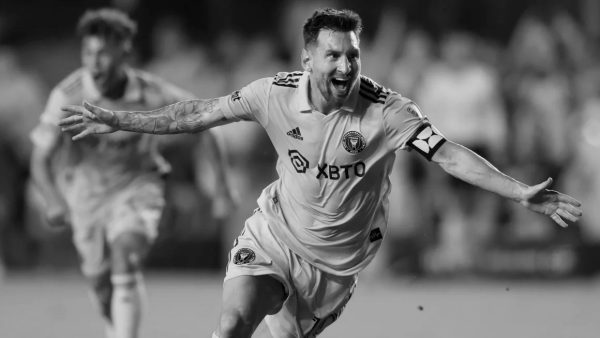We Keep Yeoing: Looking Back and Looking Forward
College third-year and cross country and track and field athlete Anna Scott competing pre-COVID-19.
In the shadow of Cleveland, Ohio, tucked away in the cornfields, lies a small town and one of the nation’s premier academic institutions, Oberlin College. But you already knew that. What you didn’t know was that the cross country and track and field team kept going under the pressure of COVID-19 and its formidable odds. They trained harder than ever before, despite the safety restrictions of the pandemic. They competed, though it seemed impossible when the semester began. And they bonded, forging relationships and trust that will last the duration of their time together and, maybe, the rest of their lives. When the world saw only two options, freezing in place or pretending nothing had changed, this team found a third: improvise, adapt, overcome. This is We Keep Yeoing: Chapter Four.
When students moved out of campus housing on Nov. 25, it marked not only the end of in-person classes but also of what has been an unusual season for the College’s cross country and track and field team. From having to limit the number of people at practice to virtual competitions, the team faced no shortage of hurdles — but coaches and players alike consider the season a success.
“Obviously, this semester had the potential to be a really isolating experience for many students,” Assistant Track and Field Coach Ben Wach said. “I’m thrilled with the kind of community that the students have created and continue to create.”
College second-year and cross country and track and field athlete Lilly Crook also really enjoyed her time with the team this semester.
“[It was] very laid back and a good place to have a stress outlet,” Crook said. “[The best parts were] just the random days with normal runs where I would show up in the worst mood, but being around such awesome people would always make me smile.”
The team was able to be productive on the track as well.
“There was such great progress this semester,” Associate Head Cross Country Coach Izzy Alexander said. “The athletes improved their performances in each intrasquad race over the course of the fall, running their fastest times in their last race.”
While inspired by the whole team, she gives extra credit to the team’s student leaders.
“Our captains and senior leadership was incredible,” Alexander said. “Things would not have gone nearly as well if it were not for the leaders on this team, the examples they set, how hard they worked, and how much they took on to try to make this the best possible experience for their teammates.”
Those leaders will have their work cut out for them again in the spring. As a result of the College’s three-semester plan, the team will undergo a dramatic reformation as second years depart campus and third-years arrive.
“The shift from having most of the second-years to having most of the third-years will likely be one of the bigger adjustments,” Wach said. “We have a large team, so it will be a lot of meeting people in person for the first time for the first-years. Those introductions and ice-breakers tend to be a lot of fun, so hopefully it brings a lot of excitement and energy to the beginning of practice. Continuing to make sure that there are abundant avenues and opportunities for the off-campus students to be as involved as they want to be will be a top priority as well.”
Including off-campus students was a high priority for the team in the fall semester, so Director of Track and Field and Cross Country Ray Appenheimer is not worried about that being an issue headed into the spring.
“Our team did a really good job this semester of keeping tabs on the third-years, including them in as many things as possible,” Appenheimer said. “We are going to miss the second-years, but we have built a really good support network for people who are off campus, and I know the second-years are going to stay as close and as involved as they can.”
Still, despite the team’s best efforts, nothing can fully mimic the camaraderie of in-person training.
“While there is so much to be grateful for in being able to even have the opportunity to have practices and to have people [on-campus], the team does not feel completely whole,” Alexander said. “There is no amount of Zoom or group chats that can replace having an entire team together in-person.”
Crook agrees. For her, the College and the team still have their merits despite the differences, but she also sees it will take some getting used to for the third-years.
“It is not the same Oberlin,” Crook said. “You can still have fun and there is still a community but there is a very real adjustment period where you have to figure out what you can expect from yourself.”
Despite the uncertainty, College third-year and cross country and track and field athlete Anna Scott is still looking forward to their return to campus.
“I’ll be returning next semester and I’m excited to be back in the good company of my teammates and friends,” Scott said. “Even if it is different, I always say that people make the place at Oberlin. So, even with the different, more isolated setup of practicing and being with the team, I’ll take any and all time I can get with them. I feel like this coming semester might involve a bit more time in my room, and a lot more time to study, and I’m excited to give myself space and time to really explore my classes next year and more academic opportunities at Oberlin.”
Transitioning to the spring semester is, arguably, going to come with even more challenges than the fall semester. With President Ambar’s announcement of the delayed start to spring semester, the team now has to contend with an unexpected extra month of separation.
While it may take more effort to maintain the bonds they’ve built, Appenheimer is certain that his athletes will be ready for the physical aspects of their sport come February.
“Each athlete has a training program provided by the coaching staff,” Appenheimer said. “The people on our team have always done a good job of training at home when no one is watching and coming back to campus in great shape. A few more weeks shouldn’t change things all that much.”
Given that COVID-19 precautions prefer erring on the side of the outdoors, the team will also have to contend with the snow, wind, and biting cold of an Oberlin winter next semester.
“We let everyone know to bring layers and layers of clothing back to campus with them,” Appenheimer said. “[Despite having access to the] indoor track, because of safety and health, we’re going to be meeting and practicing outside the entire winter and spring.”
One question remains on everyone’s mind: With the delayed start, and with the increasing prospect of a COVID-19 vaccine, will in-person athletic competitions be able to return in the spring?
“To be honest, I’m not that concerned with the presence or absence of a traditional competitive season,” Wach said. “Students’ safety has to be the first priority, and I think the team showed during the fall semester that they can make great progress within the confines of a non-traditional season. Don’t get me wrong, I love track meets, but the benefits of this sport and this team are not limited to the results of those meets.”
If Wach is on the fence regarding the possibility of a spring season, Scott believes firmly that no season will take place.
“In all honesty, I don’t think we will have a season for indoor or outdoor track,” Scott said. “The track season will probably look similar to how the cross country season looked: intrasquad meets and time trials in place of multi-school competitions.”
With the conclusion of the fall semester comes change, painful goodbyes, and the opportunity for growth. Looking back on this unforgettable semester, coaches and players want each other to know how grateful they are for each other.
“[The coaches] were so amazing this semester and really served as emotional rocks for the entirety of the team,” Crook said.
Scott agrees.
“The coaches have been incredibly supportive,” Scott said. “They have given me space but also stayed in close contact. I really appreciate the hard work that they put in 24/7 to make the experience of the team worthwhile no matter where I am in the world.”
For the coaches, this experience showed a strength in their team that they’d seen before, but never on full display quite like this.
“Coach [Alexander] signs off on many team emails by saying ‘You are strong and you are loved,’” Wach said. “I want each person to know that the coaches are available and that [Coach Alexander’s] sign-off is true.”
Alexander also marveled at the power and perseverance of her team.
“I want the athletes to know how proud of them I am, how heartened I am by their attitudes and resilience,” Alexander said.
At the end of the day, their membership in this team is something that will remain a constant through adversities yet to come.
“They are a part of something special,” Appenheimer said. “Whether they are on campus or not, they are a part of something special. Our team has an energy they can give to and take from whenever they like or need. Their teammates and coaches are here for them — and not only for four years. After sixteen years at Oberlin, I have seen, from our alums, that it is an energy they draw upon for a very long time. If they choose, it can be with them always.”
That’s a wrap on this season of We Keep Yeoing! Thank you to everyone who tuned in. The Review will continue to closely monitor the College’s response to COVID-19 and its impact on the spring semester. So, stay tuned (but, maybe don’t hold your breath?) for the next installment of We Keep Yeoing, to see a glimpse into teamwork and community in this bold and unprecedented time …


